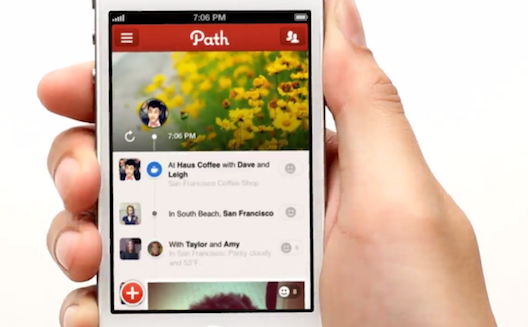Why did Path have a sudden recent surge in popularity in France, the UAE, and Bahrain?


Two days ago, TechCrunch
spotted a peculiarity on the French App Store. Path, the two-and-a-half
year old social network almost no one has heard of, went from
not even being one of the top 1500 most downloaded apps
in France this April, to ranking at #740 on May 8th, to hitting #1 on May 11th and staying there for 6
consecutive days.
Path is a uniquely private social network that allows users to
check in to places and share statuses, pictures, music with only
150 of their closest friends. The platform came under fire in late
April for
spamming users, comically calling and texting various
contacts of at least a few users. It's also been blocked from
accessing users' contacts on Facebook. However, apparently
spam was not reported during the May surge in France, nor did the
service use any advertisement beyond a few Facebook ads,
says
co-founder Dave Morin.
Even Gregory Pouy, the go-to analyst for everything digital in
France, couldn't really find a reason. He discussed
generic factors (smartphone penetration, old press coverage) and
pointed out that Path was an answer to a growing need for privacy
and authenticity on social networks. Is it enough to explain this
bizarre success?
A surge in the Arab world
We did some investigation and discovered that Path had a similar
fate in some Arab countries. On February 10th, the app climbed to
the top 10 most downloaded overall apps
in the UAE for 5 days, and then went back to ranking
between 500th and 1000th overall.
The day after, on February 11th, something similar happened
in Bahrain; the app hit the top 20 for
eight days, and then dropped back down to ranking closer to
1000th for most downloaded apps overall. The surge could have been
tied to the 14 February uprising celebration in
Bahrain; perhaps protestors preferred a less conventional or more
private social network to exchange information on over that
week.
In Qatar, the app seems to be doing well,
clocking in at around the
250th most downloaded app. For the last month, Path's
ranking in Saudi was, on average, also in that range:
not bad, but not suspicious.
In all of the other Arab countries, the app rarely makes it to
the top 1500 for most downloaded apps overall, according to
AppAnnie.
Who's using Path?
So why the sudden rise in France, and erratic behavior in the
Gulf? After it was accused of spamming users
on Facebook, Facebook restricted
Path's access on May 3, 2013. By May 8th,
Path couldn't have been spamming French users, unless the surge was
a delayed effect of earlier spam.
It's also difficult to figure out who exactly is using the app.
Pouy says it's a Paris-based phenomenon, but, in a quick straw poll
of the early adopters I know there, who typically create accounts
on all new social networks, only a few had opened Path accounts,
and all uninstalled the app a year ago. So who's using the
app?
Another possible explanation is teenagers.
We all know how teenagers are: they don’t want to have to do
anything with their parents or any other grownups. That’s why
they’re not using Facebook anymore, that’s also why they’re looking
for new networks to communicate freely and privately.
We polled a few of our readers on Facebook as well; none of them
were teenagers, but all predicted the death of
Path:
"It is not too engaging regardless of its excellent design and
features. Not too sure if it could survive naturally," said Rasha
Ali, from Ramallah.
Hatem Amin, an Egyptian living in Saudi who works as a graphic
designer, agrees. "I don't think it
will survive, although it was having a very promising
beginning."
"It's a matter of time for it to die,"
concurred Wissam Aboueida, who works for business media company
Terrapinn in the UAE.
Lebanese entrepreneur Abed Agha, founder of mobile entertainment
platform Vinelab, noted that he was using the app: "Yes, but for
how long?"
What about you, are you using Path? Who do you think is using it in general? Do you believe it could be the next Facebook?


